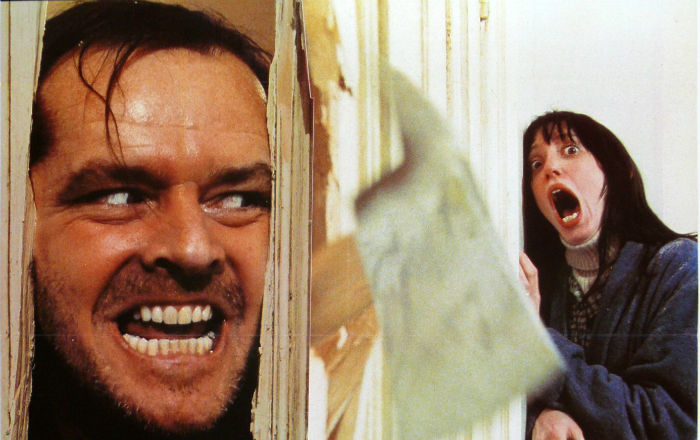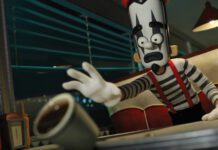Stephen King vs. Stanley Kubrick: The Shining Redux

Written by Greta Hyland
I was three years old when “The Shining” was published. I’m not sure how old I was when I first saw the movie, but looking back I was probably around 12 and I remember my sister sleeping in my room for a month after watching it. I remember liking the film, but because I was so young when I saw it, I am certain my analysis didn’t amount to much more than, “It was good.”
Fast-forward to last year. A headline caught my eye. Though I don’t recall the exact title, it was something along the lines of Stephen King hated Kubrick’s rendition of “The Shining.” It shocked me. “The Shining” is a classic; how could Stephen King hate it – and furthermore, why? I actually didn’t read the article. I decided I would read the book first, re-watch the movie, and then look at what King had to say.
I am not a big horror fan, mostly because I don’t like feeling scared. The first book I read by Stephen King was “Needful Things” and after reading I felt so soaked in evil that I the only other book I read by him was his non-fiction book, “On Writing.” I can appreciate King’s talent and gift for writing, but I purchased “The Shining” with a mixture of curiosity and dread. But having finished it, my overwhelming analysis is that it is a tragedy more than a horror story. Sure, it’s horrific, but for much different reasons than I had anticipated.
What is most scary about The Shining in my mind was two-fold: 1. You can relate to the characters, even Jack Torrance; and 2. We choose evil. We make the choice to accept it or reject it. Perhaps if I had read this book before becoming a mother it would have struck me differently, but throughout the book I was screaming at Jack to make the right choice, screaming at Wendy to pay attention to what her son was telling her, and wanted to reach into the book and pull Danny out. And of course, I loved Dick Hollorann for his goodness – and was relieved he was there as a counter-weight to all the bad.
But as the book progressed, I found that I could relate to Jack. I could relate to him all the way to the point where he chooses the hotel over his son. At that point he became truly horrific in my mind, but it’s not so uncommon. How often have we chosen something bad for us, for our loved ones, and suffered the consequences that came with it? How many times have we lost our temper, been annoyed, or given in to a desire we shouldn’t have?
The really frightening thing about this book was the reality of what was happening in Jack’s head and what he was saying and doing on the outside. The thought that a person you love could be harboring such anger, frustration, disappointment, and fear and not even be aware of it until it is too late, is tragic. King does a good job of making you both hate Jack and empathize with him.
If you take the demonic hotel out of the story, you could have a real-life story about alcoholism, mental illness, or just character flaws. What you see is the fragility of human beings, the luck of the draw in life that places you with parents, people, or in events that you have no control over but which influence you. And then the test is how you respond. We have a choice. We just don’t get to choose the outcome.
So the reason King didn’t like Kubrick’s take on “The Shining” is that is lacked the humanity the book had. King said it was “cold” and that the characters seemed to be responding to something outside of them, rather than inside. He hated Wendy’s character in the movie because he believed it was a misogynistic rendition of her, rather than the heroic person she was in the book. He thought Kubrick made Jack crazy from the get-go rather than showing a man slowly choosing the wrong path and facing the destruction that came with it.
After reading the book, I have to say that I agree with Stephen King, or at least see where he is coming from. From the articles I read, I learned that “The Shining” was a relatively autobiographic novel. King suffered with alcoholism and drug abuse. He chose not to let those things control his life, but he was Jack Torrance – or at least, he was the inspiration behind the character. Perhaps writing “The Shining,” like all great literature, allowed him to explore the dark side without actually choosing it. Maybe creating this fictional version of himself and giving in to his darker desires by walking that road enabled him to choose a different one.
I still like the movie. Film is a different medium and adaptations are just that. It is a rare movie that I like as much as a book, but it happens. Based on what I have seen from Kubrick, I’m not sure it’s his style to delve into the murky underworld and suffering of the human heart. His work reveals the face beneath the mask – the cold, uncaring veneer of humanity. I think it would have taken a different director to be able to portray what King was able to articulate in his book, but I’m not convinced that would have made a better movie. Like all great art, the movie will drive the curious to look deeper. Those who are really curious will read the book and be surprised by what they find there.
So who wins? Well, I guess it depends on what you are looking for and what you are interested in. Both reveal something about art, about people, and about interpretation. I have not been disappointed by either. But my heart does go out to King. All creators care about their creations, even the monsters, and when someone else takes it and manipulates it into something else, it’s normal and understandable to dislike the altered version. Incidentally, the recent articles came about because Danny grew up in King’s sequel to “The Shining” in his latest book, “Doctor Sleep.” Guess I am going to have to read that one next. Personally, I’d like read the “real” story behind “The Shining” if Stephen King ever felt the desire to write another non-fiction.



